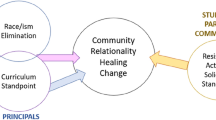Abstract
This essay looks at Ethnic Studies activism in Arizona through a rhetorical lens in order to highlight epistemological aspects of activities such as a high school Chicano Literature class, Roberto “Dr. Cintli” Rodriguez’s journalism, and student activism to defend the Mexican-American Studies Department. Taking rhetoric’s premise that language is at the center of knowledge construction (epistemology), this essay turns to Chicano activism as a language that produces knowledge differently. The participation of students, particularly in the indigenous spiritual runs, is an important example of the traditionally central role of students to the field of Chicano Studies. Runs also work inwardly to strengthen participants and build group cohesion. These practices, like Chicano and Ethnic Studies in general, constitute a critical dialectical way of thinking, a disruptive opposition to traditional rationalities that tend to gloss over colonialist histories and justify status quo racial inequalities. Thinking about these activities rhetorically allows readers to understand how the participants communicate with a wider audience and how they generate knowledge uniquely around Chicano Studies.
Similar content being viewed by others
References
Acosta, C. (2007). Developing critical consciousness: Resistance literature in a Chicano literature class. English Journal, 97(2), 36–42.
Acosta, C. (2011). Interview. June 4, 2011.
Acuna, R. (2004). Occupied America. New York: Pearson/Longman.
Anzaldua, G., & Moraga, C. (Eds.). (1981). This bridge called my back: Writings by radical women of color. New York: Kitchen Table—Women of Color Press.
Baca, D. (2008). Mestiz@ scripts, digital migrations, and the territories of writing. New York: Palgrave Macmillan.
Bennett, J. (2009). Vibrant matter: A political ecology of things. Durham: Duke University Press.
Burke, K. (1966). Language as symbolic action: Essays on life, literature, and method. Los Angeles: University of California Press.
Giroux, S. (2010). Between race and reason: Violence, intellectual responsibility, and the university to come. Stanford, CA: Stanford University Press.
Giroux, H. A. (March, 2004). Cultural studies, public pedagogy, and the responsibility of intellectuals. Communication and Critical/Cultural Studies, 1(1), 59–79.
Gonzalez, N. (May 28, 2011). Lecture. Humanizing education as a tool for resistance and self-determination. Association of Raza Educators Conference.
Gumbrecht, H. U. (2004). Production of presence: What meaning cannot convey. Stanford, CA: Stanford University Press.
Jameson, F. (2009). Valences of the dialectic. London: Verso.
Moraga, C. (2000). Loving in the war years: Lo Que Nunca Paso Por Sus Labios. Cambridge, MA: South End Press.
Nunley, V. L. (2007). From the harbor to da academic hood: Hush harbors and the African American rhetorical tradition. In Elaine B. Richardson and Ronald L. Jackson II (Eds.), African American Rhetoric(s): Interdisciplinary Perspectives (pp. 221–241). Carbondale, IL: Southern Illinois University Press.
Nunley, V. L. (2011). Keepin it hushed: The barbershop and African American hush harbor rhetoric. Detroit: Wayne State University Press.
Retamar, R. F. (1989). Caliban and other essays. Minneapolis: University of Minnesota Press.
Rodriguez, R. C. (2009–2011). Column of the Americas (online column archives).
Rodriguez, R. C. (2012). Corriendo educando or teaching/learning while running. International Journal of Critical Indigenous Studies, 5(1), 79–92.
Serna, E. (2012). The Raza studies discipline and why we need it in Los Angeles high schools. Regeneracion: The Association of Raza Educators Journal, Winter 2012, 3(1), 19–25.
Soto, S. K. & Joseph, M. (2011). Neoliberalism and the battle over ethnic studies in Arizona. Thought and Action: NEA Higher Education Journal, Fall 2011, 45–56.
Thomas, D. (1999). Reading Nietzsche rhetorically. New York: The Guilford Press.
Troop, D. (2010). Runing jogs the academic mind. Chronicle of Higher Education, 57(2), A1–A19.
Turner, V., & Turner, E. (1978). Image and pilgrimage in Christian culture: Anthropological perspectives. New York: Columbia University Press.
UNIDOS Takes Over School Board (April 11, 2011). http://www.youtube.com/watch?v=tPZxCDMbZec.
Author information
Authors and Affiliations
Corresponding author
Rights and permissions
About this article
Cite this article
Serna, E. Tempest, Arizona: Criminal Epistemologies and the Rhetorical Possibilities of Raza Studies. Urban Rev 45, 41–57 (2013). https://doi.org/10.1007/s11256-012-0223-4
Published:
Issue Date:
DOI: https://doi.org/10.1007/s11256-012-0223-4




